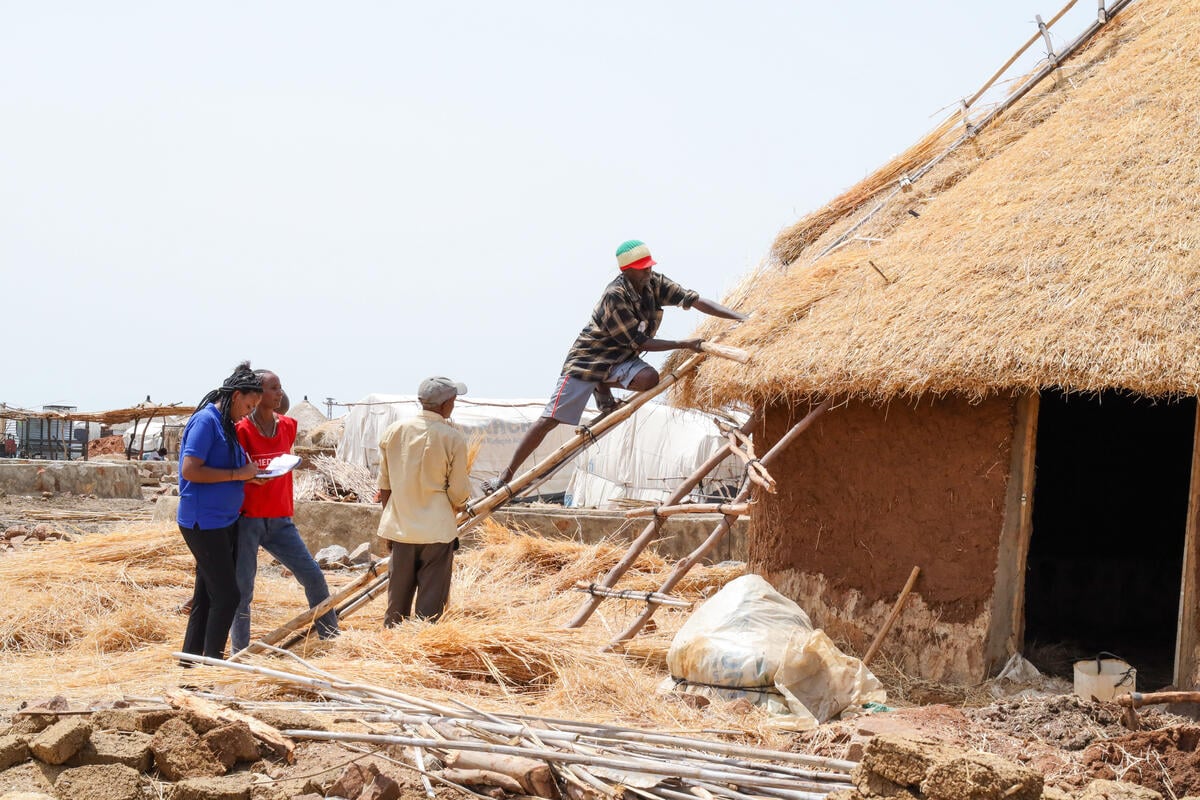UNHCR sends tents to help victims of Afghan earthquake
UNHCR sends tents to help victims of Afghan earthquake

Afghan returnees back home in the Shomali Plain.
KABUL, March 26 (UNHCR) - The U.N. refugee agency sent 500 tents to Nahrin District to help the victims of the earthquake that hit Afghanistan Tuesday, and plans were under way to send additional aid to the thousands of newly displaced Afghans.
The quake hit the Nahrin and Burqa districts in the northern part of the country, killing several thousand people according to the latest government estimates. The area was home to many of the refugees now in Pakistan who were forced to flee heavy fighting between the former Taliban rulers and the Northern Alliance in 2000.
A joint U.N. interagency team, including two UNHCR staff, set out from Pul-I-Khumri early Tuesday morning to assess the situation as aftershocks from Monday night's earthquake were still rocking the region.
Five villages north-east of Pul-I-Khumri were reported to be seriously affected by the earthquake that was pegged at 5.9 on the Richter scale and the successive aftershocks. The relatively shallow depth of Monday's tremor meant that it had devastating force to shatter the region's typical mud-brick dwellings.
"We've been told that whole villages have been razed to the ground," Peter Kessler, a UNHCR spokesman, told a news briefing in Geneva.
The U.N. assessment team visiting the zone was advised by local authorities that five villages - Tawashah, Dala, Shari Kuna, Kasabihan and Arakash - were seriously affected, with possibly 800 people killed. Other estimates put the death toll in the thousands.
U.N. refugee agency staff who reached the devastated zone late on Tuesday reported that up to 10,000 people have been displaced by the tremors, and were told that 1,000 people had died and 300 people were injured in the five villages.
Relief agencies operating in the region have formed an "emergency committee" and are currently visiting villages throughout the area to establish the scale of the disaster and the needs faced by the already war-ravaged communities in the zone.
UNHCR staff in nearby Mazar-i-Sharif and Kabul immediately put additional relief items on stand-by to go into the zone. UNHCR plans to send 1,240 plastic tarpaulins and tents early Wednesday morning from its stockpile in Kabul, while thousands of additional items are being readied in Mazar-i-Sharif and Peshawar, Pakistan.
Monday's earthquake also gave reason for UNHCR to further caution Afghans interested in heading homewards.
"We are advising Afghan refugees and displaced persons not to return to Nahin and other badly affected areas of Baghlan," Kessler said.
Meanwhile, the repatriation operation at the Takhtabaig registration centre near the Pakistani city of Peshawar resumed Tuesday following last week's Muharam holiday. The number of returnees who have registered at the centre since the programme began March 1 was expected to pass the 90,000 mark during the day.
UNHCR reinforced its staff at the centre over the Muharam holiday to handle the unexpected flow, hiring and training an additional 75 workers to register the returning Afghans. The agency is also opening other registration centres in Pakistan and expects to begin assisting returnees from Iran on April 9.
In addition, UNHCR has opened 10 of the 32 planned relief distribution points inside Afghanistan where the returnees can collect assistance packages once they reach their home areas. The packages include plastic tarpaulins, blankets, stoves, tools, hygienic supplies and other items along with 150 kilogrammes of wheat provided by the World Food Programme.
The surprising number of refugees who have chosen to return has strained UNHCR's finances, and officials from the agency briefed donor states on Tuesday about its operations in Afghanistan and the surrounding region.
"In view of the fast pace of the joint repatriation programme and with the arrival of Spring, we're urging donors to step up the rate of contributions as well because we need to get everything in place now," Kessler said.
UNHCR has received $128.6 million of the $271 million needed for its programmes to assist returning Afghans and help the more than 3.5 million refugees and internally displaced persons under the agency's care.
In a separate operation, UNHCR, the Afghan Ministry of Reparation and the International Organization of Migration have returned some 9,000 internally displaced persons since March 6 from the decaying former Soviet compound in Kabul to their homes in the Shomali Plain.









